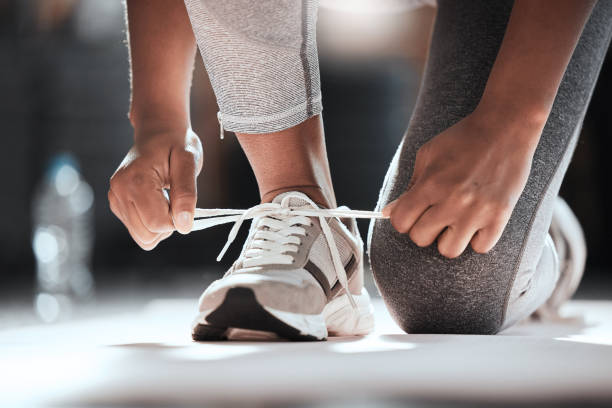Whether you’re a gal with dainty Cinderella feet or a tall guy who jokingly refers to his feet as skis, healthy feet are critical to quality of life. Here are some proven tips from Modern Medicine to help keep your feet in tip-top shape.
Wash feet daily with lukewarm water and soap, dry them thoroughly, especially between toes and wear socks that move moisture away from the feet. Trim toenails straight across and avoid cutting them too short, which can cause ingrown nails.

Wear the Right Shoes
Your feet carry your weight and help you move, so they deserve proper care. Wearing shoes that fit well, support your feet and cushion them can prevent a wide variety of foot problems including bunions, hammertoes, joint pain, blisters and sore muscles.
The right footwear can also improve posture and balance, reducing foot and back pain. It can even enhance athletic performance by providing better control, stability and agility.
Wearing shoes that are made for the activity you do is especially important. Shoemakers now offer specialized shoes for a wide range of activities including running, tennis and walking. Shoes that are engineered for a specific activity are best because they will provide the right amount of support for your feet.
It’s also important to keep your feet clean and dry. Bathing them daily with lukewarm water and gently rubbing them with a soft, moisturizing soap can help eliminate bacteria and fungus that lead to infections such as athlete’s foot. Trim your toenails straight across and avoid cutting them in corners or on the edges, which can cause ingrown toenails.
Eat a Balanced Diet
We all know that healthy eating can improve overall health, boost energy and prevent certain diseases and ailments. But what many people don’t realize is that the food we eat can also affect foot health.
For example, a diet high in sugar and processed foods can lead to poor circulation. This can cause pain in the feet and legs, as well as make it harder for your immune system to purge bacteria from the area. Additionally, fatty meats and foods containing trans fats can increase inflammation in the body, which can exacerbate conditions like plantar fasciitis and arthritis.
On the other hand, a diet rich in vitamins and minerals can support healthy feet. For instance, calcium-rich foods can help strengthen the bones in your feet. This will help reduce your risk of osteoporosis, which can lead to stress fractures in the feet and ankles. Good sources of calcium include dairy products, leafy greens and fortified beverages. You should also eat plenty of vitamin D, which helps your body absorb calcium. This can be found in a wide range of foods, including fish, fortified breakfast cereals, eggs and sardines.
Get Regular Checkups
Most people think of their feet as being unimportant, but the truth is that foot health is extremely important. Your feet are an intricate mechanical system that is responsible for your balance and mobility. They are also one of the first parts of the body to show warning signs for serious conditions that can affect the entire body. Regular foot checkups at podiatrist Ballarat can help catch major problems before they start to impact your quality of life..
Taking care of your feet will pay off in the long run. Good foot health can mean less pain and discomfort, increased strength and flexibility, better posture and overall well-being. It’s best to nip any problems or issues in the bud rather than waiting until they turn into a major problem that is much more difficult to treat.
Remember to practice good foot hygiene by washing your feet daily with a mild soap and thoroughly drying them, especially between the toes. Wear shoes that fit properly and avoid wearing the same pair of shoes two days in a row.
Practice Good Hygiene
It might sound like a no-brainer, but practicing good foot hygiene is essential to keeping them healthy. This includes washing them daily, especially between the toes, and making sure they are completely dry before putting on socks or shoes. Also, it’s important to trim your toenails regularly so they don’t become ragged or hang over the edge of the toe box, which can cause painful ingrown toenails.
In addition to keeping your feet clean, it’s important to wear comfortable shoes that fit well and offer plenty of toe space. This will help prevent many common foot problems, such as bunions and hammertoes. It’s a good idea to change your shoes frequently, as wearing the same pair for too long can lead to blisters and odor.
It’s also a good idea to wear socks made from natural or man-made fibers that breath, and to change them daily (more often if you sweat heavily). Wearing padded socks can help reduce the risk of tinea pedis, and using an antifungal powder on your feet can also be beneficial.
Avoid Walking Barefoot
While it may feel refreshing to go without shoes for extended periods of time during the COVID-19 pandemic, you are putting your feet at risk of injury and infection. Walking barefoot exposes your feet to various elements that could harm them, such as rough or uneven terrain, hot pavement and the possibility of stepping on sharp objects. It can also make it harder to notice that you have cuts on your feet or to get proper treatment if you do sustain an injury.
In addition, walking barefoot can cause pain in the balls of your feet when the foot is forced to spring unsupported off the ground. The pain can be aggravated in people with foot problems such as bunions, hammertoes and pinched nerves. It can also exacerbate problems such as achy heels, scaly feet and fungal infections like athlete’s foot or toenail fungus. If you decide to walk barefoot, be sure to wear flip flops or sandals with good arch support and shock absorption. Also, remember to moisturize your feet regularly with a rich cream or lotion.







